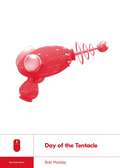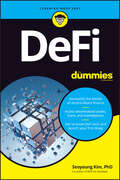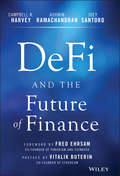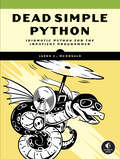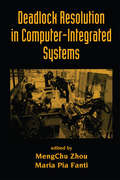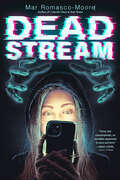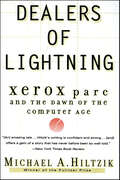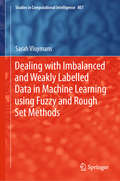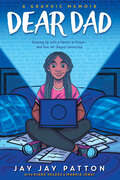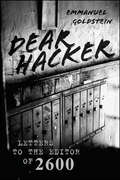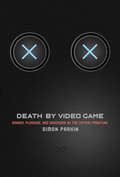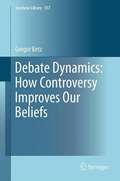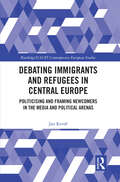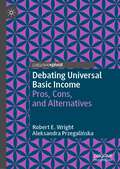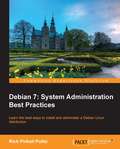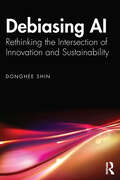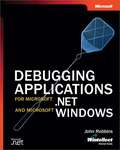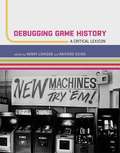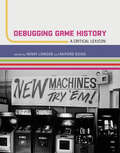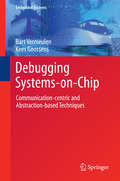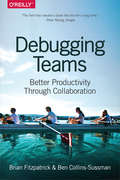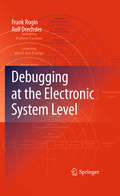- Table View
- List View
Day of the Tentacle (Boss Fight Books)
by Bob MackeySix years after helping the Edison family defeat the designs of a malevolent meteor in Maniac Mansion, college student and classic nerd Bernard Bernoulli once again finds himself at the front door of the infamous mansion. With two weird friends, Hoagie and Laverne, Bernard must stop the evil Purple Tentacle from conquering the world—by freezing hamsters, pushing old ladies down the stairs, abusing Swiss bank accounts, and ever so slightly changing some of the most significant moments in American history. Dave Grossman and Tim Schafer&’s 1993 time-trotting point-and-click adventure game Day of the Tentacle brought LucasArts' game design to a new standard of excellence with smart puzzles, hilarious characters, and an animation style that harkened back to classic Warner Bros. cartoons. And somehow, they fit it all on a fat stack of floppy disks! In this definitive oral history as told by the game&’s designers, musicians, and artists, writer Bob Mackey tells the inside story of Day of the Tentacle&’s lightning-in-a-bottle production, and reveals how two first-time directors boiled down the lessons of past adventure games into a tight and satisfying experience, how their team grappled with evolving technology to achieve the coveted status of multimedia at the dawn of the CD-ROM age, and how a remastered edition brought Tentacle to a new generation of fans.
DeFi For Dummies
by Seoyoung KimGet to know the building blocks of a new economy The promise of decentralized finance (DeFi for those up on their financial lingo) as a disruptor to financial institutions makes it must-know for anyone involved in finance. DeFi For Dummies provides an easy-to-understand option for unraveling the past, present, and future of DeFi. Understand current DeFi applications, including how to build basic applications on the leading platforms, and get a look into the future&’s most promising new DeFi solutions. Staying ahead of the game is critical for finance professionals these days, and this Dummies guide makes it possible, with full coverage of how DeFi affects asset management, lending and borrowing, and investment markets. Wrap your mind around DeFi and start getting hands on, the Dummies way. Learn how the DeFi revolution started and where it&’s going Get insight into opportunities for getting started and building value with DeFi Discover the leading assets, exchanges, and marketplaces built on DeFi principles Create secure DeFi applications on established platformsThis book is great for current pros or active investors in the world of finance who need to get up to speed on the world of DeFi as quickly and clearly as possible.
DeFi and the Future of Finance
by Campbell R. Harvey Ashwin Ramachandran Joey SantoroDuring the Global Financial Crisis in 2008, our financial infrastructure failed. Governments bailed out the very institutions that let the economy down. This episode spurred a serious rethink of our financial system. Does it make any sense that it takes two days to settle a stock transaction? Why do retailers, operating on razor thin margins, have to pay 3% for every customer credit card swipe? Why does it take two days to transfer money from a bank account to a brokerage—or any other company? Why are savings rates miniscule or negative? Why is it so difficult for entrepreneurs to get financing at traditional banks? In DeFi and the Future of Finance, Campbell R. Harvey, Ashwin Ramachandran and Joey Santoro, introduce the new world of Decentralized Finance. The book argues that the current financial landscape is ripe for disruption and we are seeing, in real time, the reinvention of finance. The authors provide the reader with a clear assessment of the problems with the current financial system and how DeFi solves many of these problems. The essence of DeFi is that we interact with peers—there is no brick and mortar and all of the associated costs. Savings and lending are reinvented. Trading takes place with algorithms far removed from traditional brokerages. The book conducts a deep dive on some of the most innovative protocols such as Uniswap and Compound. Many of the companies featured in the book you might not have heard of—however, you will in the future. As with any new technology, there are a myriad of risks and the authors carefully catalogue these risks and assess which ones can be successfully mitigated. Ideally suited for people working in any part of the finance industry as well as financial policy makers, DeFi and the Future of Finance gives readers a vision of the future. The world of finance will fundamentally be changed over the coming decade. The book enables you to become part of the disruption – not the target of the disruption.
Dead Simple Python: Idiomatic Python for the Impatient Programmer
by Jason C McDonaldThe complete core language for existing programmers.Dead Simple Python is a thorough introduction to every feature of the Python language for programmers who are impatient to write production code. Instead of revisiting elementary computer science topics, you&’ll dive deep into idiomatic Python patterns so you can write professional Python programs in no time. After speeding through Python&’s basic syntax and setting up a complete programming environment, you&’ll learn to work with Python&’s dynamic data typing, its support for both functional and object-oriented programming techniques, special features like generator expressions, and advanced topics like concurrency. You&’ll also learn how to package, distribute, debug, and test your Python project. Master how to:Make Python's dynamic typing work for you to produce cleaner, more adaptive code.Harness advanced iteration techniques to structure and process your data.Design classes and functions that work without unwanted surprises or arbitrary constraints.Use multiple inheritance and introspection to write classes that work intuitively.Improve your code's responsiveness and performance with asynchrony, concurrency, and parallelism.Structure your Python project for production-grade testing and distribution The most pedantically pythonic primer ever printed, Dead Simple Python will take you from working with the absolute basics to coding applications worthy of publication.
Deadlock Resolution in Computer-Integrated Systems
by MengChu Zhou Maria Pia FantiComplex computer-integrated systems offer enormous benefits across a wide array of applications, including automated production, transportation, concurrent software, and computer operating systems, computer networks, distributed database systems, and many other automated systems. Yet, as these systems become more complex, automated, distributed, and computing-intensive, the opportunity for deadlock issues rises exponentially. Deadlock modeling, detection, avoidance, and recovery are critical to improving system performance.Deadlock Resolution in Computer-Integrated Systems is the first text to summarize and comprehensively treat this issue in a systematic manner. Consisting of contributions from prominent researchers in the field, this book addresses deadlock-free models and scheduling, detection and recovery methods, the formulation of dynamic control policies, and comparison and industrial benchmark studies that evaluate various approaches. The editors lay the foundation for exploring deadlock issues with a typical example of an automated manufacturing process, illustrating three primary modeling methods (digraphs, Petri nets, and automata) and comparing their respective advantages and disadvantages.Providing all of the important models and resolution approaches, this book is the complete guide for electrical and control engineers and manufacturing, intelligent, and network systems designers to prevent and manage deadlock issues in their systems.
Deadstream
by Mar Romasco-MooreRear Window meets The Ring in this sinister YA thriller, in which a teen girl witnesses the livestreamed murder of a popular online streamer by a paranormal entity . . . and could be its next victim.After surviving a car accident that claimed the life of her best friend, Teresa is now terrified to leave the safety of her bedroom. Since then, her only solace and window to the outside world has been the online community she found through streaming.But one night, the safe world Teresa created starts to break down. A shadowy figure appears in the background of her favorite's streamer's video, and his behavior mysteriously changes over the next few days before he dies in front of thousands of viewers. Teresa finds herself at the center of a life-and-death investigation as the world tries to figure out what or who this figure could be . . . especially as it begins appearing in the other people's streams, compelling them to "open the door" and let it in—including Teresa&’s own. In order to save herself and the rest of the internet from this relentless entity, Teresa must venture outside of the mental and physical walls she&’s created. But will she be able to conquer her fears before anyone else loses their life?
Dealers of Lightning: Xerox PARC and the Dawn of the Computer Age
by Michael A. HiltzikThe Pulitzer Prize-winner’s classic account of the legendary research lab that gave rise to the Digital Age.In the 1970s and ‘80s, Xerox Corporation brought together a brain-trust of engineering geniuses dubbed PARC (Palo Alto Research Center). This brilliant group created several monumental innovations that triggered a technological revolution, including the first personal computer, the laser printer, and the graphical interface (one of the main precursors of the Internet). And when these breakthroughs were rejected by the corporation, these determined inventors turned their ideas into empires that changed the world.Based on extensive interviews with the scientists, engineers, administrators, and executives who lived the story, Dealers of Lightning details PARC’s rise from humble beginnings to a hothouse for ideas. It also shows why Xerox was never able to grasp the cutting-edge innovations PARC delivered. Michael A. Hiltzik offers an unprecedented look at the ideas, the inventions, and the individuals that propelled Xerox PARC to the frontier of techno-history—and the corporate machinations that almost prevented it from achieving greatness.
Dealing with Imbalanced and Weakly Labelled Data in Machine Learning using Fuzzy and Rough Set Methods (Studies in Computational Intelligence #807)
by Sarah VluymansThis book presents novel classification algorithms for four challenging prediction tasks, namely learning from imbalanced, semi-supervised, multi-instance and multi-label data. The methods are based on fuzzy rough set theory, a mathematical framework used to model uncertainty in data. The book makes two main contributions: helping readers gain a deeper understanding of the underlying mathematical theory; and developing new, intuitive and well-performing classification approaches. The authors bridge the gap between the theoretical proposals of the mathematical model and important challenges in machine learning. The intended readership of this book includes anyone interested in learning more about fuzzy rough set theory and how to use it in practical machine learning contexts. Although the core audience chiefly consists of mathematicians, computer scientists and engineers, the content will also be interesting and accessible to students and professionals from a range of other fields.
Dear Dad: Growing Up with a Parent in Prison -- and How We Stayed Connected
by Kiara Valdez Jay Jay Patton Antoine PattonA stunning graphic novel memoir about growing up with an incarcerated parent." ...Your dad is coming back home."As far back as nine-year-old Jay Jay Patton can remember, her dad, Antoine has been in prison. Growing up in Buffalo, New York with her mom and younger brother, she's only been to visit him twice. Instead, the two have sent each other numerous letters -- Jay Jay's letters can take weeks or months to reach her dad, and some never even get delivered. What's it going to be like having Dad home?This powerful coming-of-age graphic novel memoir tells Jay Jay Patton's life of growing up with a dad in -- and out of -- prison. How she and her dad were able to develop a powerful father/daughter bond and create Photo Patch -- a life-changing application that connects children to incarcerated parents. Because no child should have to grow up unable to engage with their parents. As Jay Jay says: "it's not a privilege for a kid to be able to talk to their parent. It's a right."
Dear Hacker
by Emmanuel GoldsteinActual letters written to the leading hackers' magazine For 25 years, 2600: The Hacker Quarterly has given voice to the hacker community in all its manifestations. This collection of letters to the magazine reveals the thoughts and viewpoints of hackers, both white and black hat, as well as hacker wannabes, technophiles, and people concerned about computer security. Insightful and entertaining, the exchanges illustrate 2600's vast readership, from teenage rebels, anarchists, and survivalists to law enforcement, consumer advocates, and worried parents. Dear Hacker is must reading for technology aficionados, 2600's wide and loyal audience, and anyone seeking entertainment well laced with insight into our society. Coverage Includes: Question Upon Question Tales from the Retail Front The Challenges of Life as a Hacker Technology The Magic of the Corporate World Our Biggest Fans Behind the Walls A Culture of Rebels Strange Ramblings For more information and sample letters, check out the companion site at http://lp. wileypub. com/dearhacker/
Death by Video Game: Danger, Pleasure, and Obsession on the Virtual Frontline
by Simon Parkin"The finest book on video games yet. Simon Parkin thinks like a critic, conjures like a novelist, and writes like an artist at the height of his powers--which, in fact, he is." --Tom Bissell, author of Extra Lives: Why Video Games MatterOn January 31, 2012, a twenty-three-year-old student was found dead at his keyboard in an internet café while the video game he had been playing for three days straight continued to flash on the screen in front of him. Trying to reconstruct what had happened that night, investigative journalist Simon Parkin would discover that there have been numerous other incidents of "death by video game." And so begins a journey that takes Parkin around the world in search of answers: What is it about video games that inspires such tremendous acts of endurance and obsession? Why do we so thoroughly lose our sense of time and reality within this medium? How in the world can people play them . . . to death?In Death by Video Game, Parkin examines the medical evidence and talks to the experts to determine what may be happening, and introduces us to the players and game developers at the frontline of virtual extremism: the New York surgeon attempting to break the Donkey Kong world record . . . the Minecraft player three years into an epic journey toward the edge of the game's vast virtual world . . . the German hacker who risked prison to discover the secrets behind Half-Life 2 . . .Riveting and wildly entertaining, Death by Video Game will change the way we think about our virtual playgrounds as it investigates what it is about them that often proves compelling, comforting, and irresistible to the human mind--except for when it's not.From the Hardcover edition.
Debate Dynamics: How Controversy Improves Our Beliefs
by Gregor BetzIs critical argumentation an effective way to overcome disagreement? And does the exchange of arguments bring opponents in a controversy closer to the truth? This study provides a new perspective on these pivotal questions. By means of multi-agent simulations, it investigates the truth and consensus-conduciveness of controversial debates. The book brings together research in formal epistemology and argumentation theory. Aside from its consequences for discursive practice, the work may have important implications for philosophy of science and the way we construe scientific rationality as well.
Debate Dynamics: How Controversy Improves Our Beliefs (Synthese Library #357)
by Gregor BetzIs critical argumentation an effective way to overcome disagreement? And does the exchange of arguments bring opponents in a controversy closer to the truth? This study provides a new perspective on these pivotal questions. By means of multi-agent simulations, it investigates the truth and consensus-conduciveness of controversial debates. The book brings together research in formal epistemology and argumentation theory. Aside from its consequences for discursive practice, the work may have important implications for philosophy of science and the way we construe scientific rationality as well.
Debates in the Digital Humanities (Debates in the Digital Humanities)
by Matthew GoldEncompassing new technologies, research methods, and opportunities for collaborative scholarship and open-source peer review, as well as innovative ways of sharing knowledge and teaching, the digital humanities promises to transform the liberal arts—and perhaps the university itself. Indeed, at a time when many academic institutions are facing austerity budgets, digital humanities programs have been able to hire new faculty, establish new centers and initiatives, and attract multimillion-dollar grants. Clearly the digital humanities has reached a significant moment in its brief history. But what sort of moment is it? Debates in the Digital Humanities brings together leading figures in the field to explore its theories, methods, and practices and to clarify its multiple possibilities and tensions. From defining what a digital humanist is and determining whether the field has (or needs) theoretical grounding, to discussions of coding as scholarship and trends in data-driven research, this cutting-edge volume delineates the current state of the digital humanities and envisions potential futures and challenges. At the same time, several essays aim pointed critiques at the field for its lack of attention to race, gender, class, and sexuality; the inadequate level of diversity among its practitioners; its absence of political commitment; and its preference for research over teaching.Together, the essays in Debates in the Digital Humanities—which will be published both as a printed book and later as an ongoing, open-access website—suggest that the digital humanities is uniquely positioned to contribute to the revival of the humanities and academic life.Contributors: Bryan Alexander, National Institute for Technology in Liberal Education; Rafael Alvarado, U of Virginia; Jamie &“Skye&” Bianco, U of Pittsburgh; Ian Bogost, Georgia Institute of Technology; Stephen Brier, CUNY Graduate Center; Daniel J. Cohen, George Mason U; Cathy N. Davidson, Duke U; Rebecca Frost Davis, National Institute for Technology in Liberal Education; Johanna Drucker, U of California, Los Angeles; Amy E. Earhart, Texas A&M U; Charlie Edwards; Kathleen Fitzpatrick, Pomona College; Julia Flanders, Brown U; Neil Fraistat, U of Maryland; Paul Fyfe, Florida State U; Michael Gavin, Rice U; David Greetham, CUNY Graduate Center; Jim Groom, U of Mary Washington; Gary Hall, Coventry U, UK; Mills Kelly, George Mason U; Matthew Kirschenbaum, U of Maryland; Alan Liu, U of California, Santa Barbara; Elizabeth Losh, U of California, San Diego; Lev Manovich, U of California, San Diego; Willard McCarty, King&’s College London; Tara McPherson, U of Southern California; Bethany Nowviskie, U of Virginia; Trevor Owens, Library of Congress; William Pannapacker, Hope College; Dave Parry, U of Texas at Dallas; Stephen Ramsay, U of Nebraska, Lincoln; Alexander Reid, SUNY at Buffalo; Geoffrey Rockwell, Canadian Institute for Research Computing in the Arts; Mark L. Sample, George Mason U; Tom Scheinfeldt, George Mason U; Kathleen Marie Smith; Lisa Spiro, National Institute for Technology in Liberal Education; Patrik Svensson, Umeå U; Luke Waltzer, Baruch College; Matthew Wilkens, U of Notre Dame; George H. Williams, U of South Carolina Upstate; Michael Witmore, Folger Shakespeare Library.
Debating Immigrants and Refugees in Central Europe: Politicising and Framing Newcomers in the Media and Political Arenas (Routledge/UACES Contemporary European Studies)
by Jan KovářThis book investigates the politicisation and framing of immigration in the media and political arena in Central Europe, examining two countries - Czechia and Slovakia - in the period surrounding the “European migrant crisis”. Following years of immigration being practically invisible as an issue in the socio-political debates in most Central and Eastern European countries, it became a key concern because of the crisis. Analyzing news media items and plenary speeches, this book reveals how securitisation eclipses humanitarian considerations, dominating the discourse around immigration and that media and politicians are the two most important intermediaries from which citizens take cues on issues they rarely experience directly themselves. Finally, it also shows how the media and political arena portray immigration differently based on the origin, religious background, and legal status of immigrants. This book will be of key interest to scholars and students of migration studies, global governance, international organisations, security studies, and media studies, as well as more broadly for public law, comparative politics and East/Central European politics.
Debating Universal Basic Income: Pros, Cons, and Alternatives (Exploring the Basic Income Guarantee)
by Robert E. Wright Aleksandra PrzegalińskaThis book presents the most compelling arguments for and against implementing a basic income guarantee today, in the voice of proponents and critics, in alternating chapters. Tables, figures, and pictures illustrate the key concepts and evidence, which include benefit cliffs and disincentive deserts, time series macroeconomic data, business, economic, and technological change (BETC), artificial intelligence and other general purpose technologies, along with advanced robotics, the environmental Kuznets Curve, income distributions, democracy, social justice, dependence, autonomy, and economic freedom. A neutral, non-partisan tone introduction defines UBI and covers the history of universal income plans, while the conclusion summarizes the main arguments for and against UBI before surveying alternative policies, including universal basic asset, credit, service, job, and training plans.
Debian 7: System Administration Best Practices
by Rich Pinkall PolleiA step-by-step, example-based guide to learning how to install and administer the Debian Linux distribution.Debian 7: System Administration Best Practices is for users and administrators who are new to Debian, or for seasoned administrators who are switching to Debian from another Linux distribution. A basic knowledge of Linux or UNIX systems is useful, but not strictly required. Since the book is a high level guide, the reader should be willing to go to the referenced material for further details and practical examples.
Debiasing AI: Rethinking the Intersection of Innovation and Sustainability
by Donghee ShinIn an era where artificial intelligence (AI) drives unprecedented change, Debiasing AI examines the vital intersection of technology, innovation, and sustainability. This book confronts the pressing challenge of bias in AI systems, exploring its far-reaching implications for fairness, trust, and ethical practices. Through a multidisciplinary lens, the author examines how human biases are embedded in large language models, amplified by coded machine learning, and propagated through trained algorithms. Practical strategies are offered to address these issues, paving the way for the development of more equitable and inclusive AI technologies.With actionable insights, empirical case studies, and theoretical frameworks, Debiasing AI offers a roadmap for designing AI technologies that are not only innovative but also ethically sound and equitable. A must-read for scholars, industry leaders, and policymakers, this book inspires a reimagining of AI’s role in creating a fairer and more sustainable future.
Debugging Applications for Microsoft® .NET and Microsoft Windows®
by John RobbinsYou get huge development advantages with Microsoft Visual Studio® .NET 2003--but you need a new bag of debugging tricks to take full advantage of them in today's .NET and Win32® development worlds. Learn lethally effective, real-world application debugging techniques for .NET Framework 1.1 and Windows with this fully updated programming guide. Debugging expert John Robbins expands the first edition of his classic debugging book with all-new scenarios and bug-killing tools, tips, and techniques. You'll see every .NET and Windows debugging scenario here--from XML Web services and Microsoft ASP.NET to Windows services and exceptions. Along with John's expert guidance, you get more than 6 MB of his battle-tested source code--for the tools and tactics you need to ship better software faster! Topics covered include: Where bugs come from and how to think about solving them Debugging during coding Operating system debugging support and how Win32 debuggers work Advanced debugger usage and .NET debugging with Visual Studio .NET Advanced native code techniques with Visual Studio .NET and WinDBG Extending the Visual Studio .NET integrated development environment Managed exception monitoring Flow tracing and performance Finding source and line information with just a crash address Crash handlers Debugging Windows services and DLLs that load into services Multithreaded deadlocks Automated testing The Debug C run-time library A high-performance tracing tool for server applications Smoothing the working set Appendixes: Reading Dr. Watson log files, plus resources for .NET and Windows developers CD-ROM features: 6+ MB of professional-level source code samples written in Microsoft Visual C++®, Visual C#®, and Visual Basic® .NET Debugging Tools for Windows Microsoft .NET Framework 1.1 SDK Windows Application Compatibility Toolkit (ACT) A Note Regarding the CD or DVDThe print version of this book ships with a CD or DVD. For those customers purchasing one of the digital formats in which this book is available, we are pleased to offer the CD/DVD content as a free download via O'Reilly Media's Digital Distribution services. To download this content, please visit O'Reilly's web site, search for the title of this book to find its catalog page, and click on the link below the cover image (Examples, Companion Content, or Practice Files). Note that while we provide as much of the media content as we are able via free download, we are sometimes limited by licensing restrictions. Please direct any questions or concerns to booktech@oreilly.com.
Debugging Game History: A Critical Lexicon
by Raiford Guins Henry LowoodEven as the field of game studies has flourished, critical historical studies of games have lagged behind other areas of research. Histories have generally been fact-by-fact chronicles; fundamental terms of game design and development, technology, and play have rarely been examined in the context of their historical, etymological, and conceptual underpinnings. This volume attempts to "debug" the flawed historiography of video games. It offers original essays on key concepts in game studies, arranged as in a lexicon -- from "Amusement Arcade" to "Embodiment" and "Game Art" to "Simulation" and "World Building." Written by scholars and practitioners from a variety of disciplines, including game development, curatorship, media archaeology, cultural studies, and technology studies, the essays offer a series of distinctive critical "takes" on historical topics. The majority of essays look at game history from the outside in; some take deep dives into the histories of play and simulation to provide context for the development of electronic and digital games; others take on such technological components of games as code and audio. Not all essays are history or historical etymology -- there is an analysis of game design, and a discussion of intellectual property -- but they nonetheless raise questions for historians to consider. Taken together, the essays offer a foundation for the emerging study of game history. ContributorsMarcelo Aranda, Brooke Belisle, Caetlin Benson-Allott, Stephanie Boluk, Jennifer deWinter, J. P. Dyson, Kate Edwards, Mary Flanagan, Jacob Gaboury, William Gibbons, Raiford Guins, Erkki Huhtamo, Don Ihde, Jon Ippolito, Katherine Isbister, Mikael Jakobsson, Steven E. Jones, Jesper Juul, Eric Kaltman, Matthew G. Kirschenbaum, Carly A. Kocurek, Peter Krapp, Patrick LeMieux, Henry Lowood, Esther MacCallum-Stewart, Ken S. McAllister, Nick Monfort, David Myers, James Newman, Jenna Ng, Michael Nitsche, Laine Nooney, Hector Postigo, Jas Purewal, Reneé H. Reynolds, Judd Ethan Ruggill, Marie-Laure Ryan, Katie Salen Tekinbas, Anastasia Salter, Mark Sample, Bobby Schweizer, John Sharp, Miguel Sicart, Rebecca Elisabeth Skinner, Melanie Swalwell, David Thomas, Samuel Tobin, Emma Witkowski, Mark J.P. Wolf
Debugging Game History: A Critical Lexicon (Game Histories)
by Raiford Guins Henry LowoodEssays discuss the terminology, etymology, and history of key terms, offering a foundation for critical historical studies of games.Even as the field of game studies has flourished, critical historical studies of games have lagged behind other areas of research. Histories have generally been fact-by-fact chronicles; fundamental terms of game design and development, technology, and play have rarely been examined in the context of their historical, etymological, and conceptual underpinnings. This volume attempts to “debug” the flawed historiography of video games. It offers original essays on key concepts in game studies, arranged as in a lexicon—from “Amusement Arcade” to “Embodiment” and “Game Art” to “Simulation” and “World Building.” Written by scholars and practitioners from a variety of disciplines, including game development, curatorship, media archaeology, cultural studies, and technology studies, the essays offer a series of distinctive critical “takes” on historical topics. The majority of essays look at game history from the outside in; some take deep dives into the histories of play and simulation to provide context for the development of electronic and digital games; others take on such technological components of games as code and audio. Not all essays are history or historical etymology—there is an analysis of game design, and a discussion of intellectual property—but they nonetheless raise questions for historians to consider. Taken together, the essays offer a foundation for the emerging study of game history. ContributorsMarcelo Aranda, Brooke Belisle, Caetlin Benson-Allott, Stephanie Boluk, Jennifer deWinter, J. P. Dyson, Kate Edwards, Mary Flanagan, Jacob Gaboury, William Gibbons, Raiford Guins, Erkki Huhtamo, Don Ihde, Jon Ippolito, Katherine Isbister, Mikael Jakobsson, Steven E. Jones, Jesper Juul, Eric Kaltman, Matthew G. Kirschenbaum, Carly A. Kocurek, Peter Krapp, Patrick LeMieux, Henry Lowood, Esther MacCallum-Stewart, Ken S. McAllister, Nick Monfort, David Myers, James Newman, Jenna Ng, Michael Nitsche, Laine Nooney, Hector Postigo, Jas Purewal, Reneé H. Reynolds, Judd Ethan Ruggill, Marie-Laure Ryan, Katie Salen Tekinbaş, Anastasia Salter, Mark Sample, Bobby Schweizer, John Sharp, Miguel Sicart, Rebecca Elisabeth Skinner, Melanie Swalwell, David Thomas, Samuel Tobin, Emma Witkowski, Mark J.P. Wolf
Debugging Microsoft® .NET 2.0 Applications
by John RobbinsThis guide features practical advice and code samples for developers at all levels from a leading authority on improving code. An expert on improving code, John Robbins steps back from the expert-level information that characterized his previous debugging books to present hands-on, practical advice for working developers on how to use the debugging, testing, and tuning features in Visual Studio 2005. In addition to an overview of the science of debugging and expertly guided instruction, this guide also features solutions to common, real-world development problems. Developers of all skill levels will be able to use this book to help improve their understanding of debugging, debugging tools, tuning, and testing.
Debugging Systems-on-Chip
by Kees Goossens Bart VermeulenThis book describes an approach and supporting infrastructure to facilitate debugging the silicon implementation of a System-on-Chip (SOC), allowing its associated product to be introduced into the market more quickly Readers learn step-by-step the key requirements for debugging a modern, silicon SOC implementation, nine factors that complicate this debugging task, and a new debug approach that addresses these requirements and complicating factors The authors' novel communication-centric, scan-based, abstraction-based, run/stop-based (CSAR) debug approach is discussed in detail, showing how it helps to meet debug requirements and address the nine, previously identified factors that complicate debugging silicon implementations of SOCs. The authors also derive the debug infrastructure requirements to support debugging of a silicon implementation of an SOC with their CSAR debug approach. This debug infrastructure consists of a generic on-chip debug architecture, a configurable automated design-for-debug flow to be used during the design of an SOC, and customizable off-chip debugger software. Coverage includes an evaluation of the efficiency and effectiveness of the CSAR approach and its supporting infrastructure, using six industrial SOCs and an illustrative, example SOC model The authors also quantify the hardware cost and design effort to support their approach.
Debugging Teams: Better Productivity through Collaboration
by Ben Collins-Sussman Brian W. FitzpatrickIn the course of their 20+-year engineering careers, authors Brian Fitzpatrick and Ben Collins-Sussman have picked up a treasure trove of wisdom and anecdotes about how successful teams work together. Their conclusion? Even among people who have spent decades learning the technical side of their jobs, most haven’t really focused on the human component. Learning to collaborate is just as important to success. If you invest in the "soft skills" of your job, you can have a much greater impact for the same amount of effort. The authors share their insights on how to lead a team effectively, navigate an organization, and build a healthy relationship with the users of your software. This is valuable information from two respected software engineers whose popular series of talks—including "Working with Poisonous People"—has attracted hundreds of thousands of followers.
Debugging at the Electronic System Level
by Rolf Drechsler Frank RoginDebugging becomes more and more the bottleneck to chip design productivity, especially while developing modern complex integrated circuits and systems at the Electronic System Level (ESL). Today, debugging is still an unsystematic and lengthy process. Here, a simple reporting of a failure is not enough, anymore. Rather, it becomes more and more important not only to find many errors early during development but also to provide efficient methods for their isolation. In Debugging at the Electronic System Level the state-of-the-art of modeling and verification of ESL designs is reviewed. There, a particular focus is taken onto SystemC. Then, a reasoning hierarchy is introduced. The hierarchy combines well-known debugging techniques with whole new techniques to improve the verification efficiency at ESL. The proposed systematic debugging approach is supported amongst others by static code analysis, debug patterns, dynamic program slicing, design visualization, property generation, and automatic failure isolation. All techniques were empirically evaluated using real-world industrial designs. Summarized, the introduced approach enables a systematic search for errors in ESL designs. Here, the debugging techniques improve and accelerate error detection, observation, and isolation as well as design understanding.
